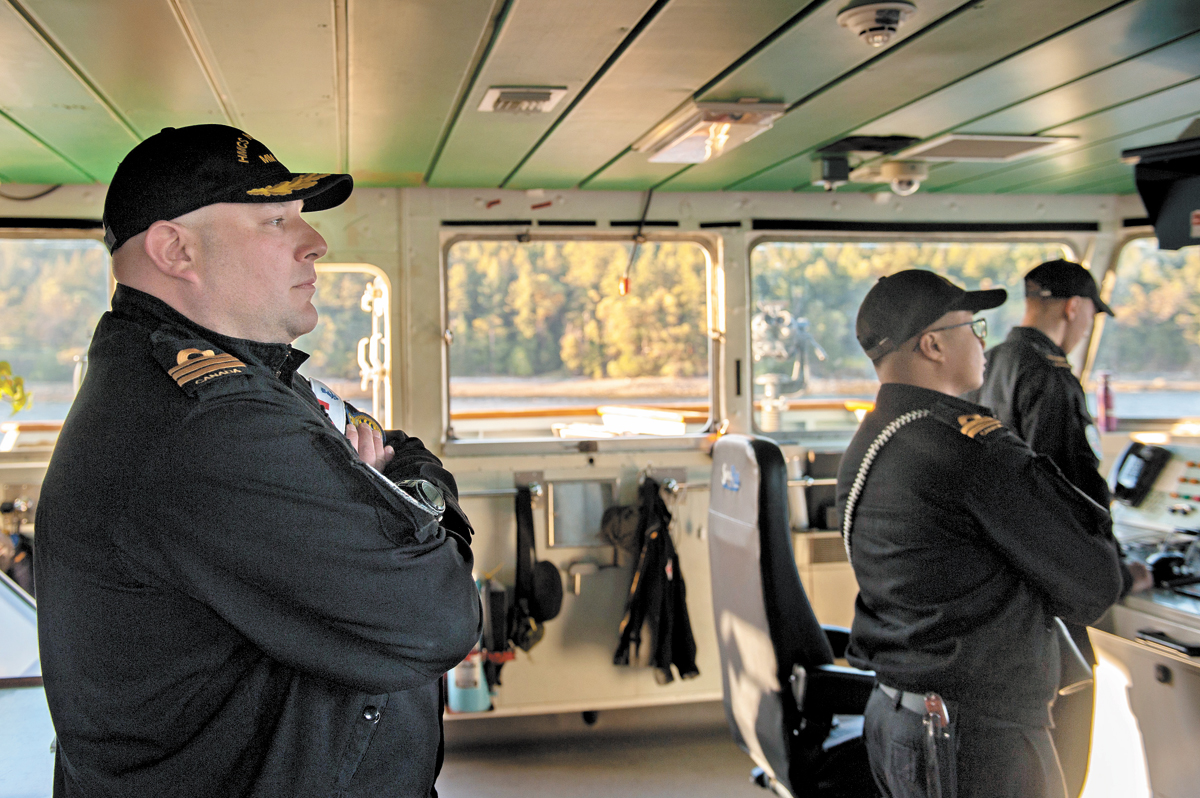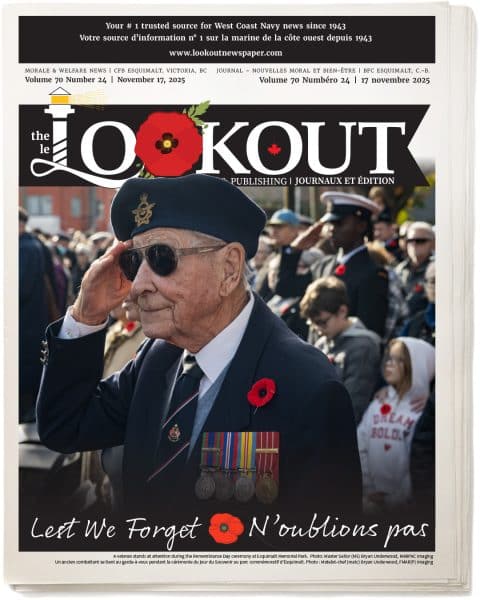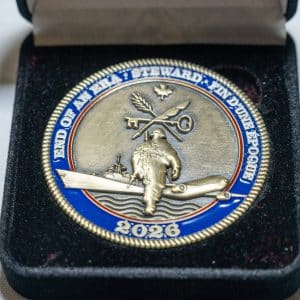
Commander Jason Bergen, Commanding Officer of HMCS Nanaimo, oversees a transit. Photo by Leading Seaman Brendan Gibson, MARPAC Imaging
Lieutenant Chelsea Dubeau, HMCS Nanaimo Public Affairs Officer ~
It’s a beautiful morning at sea. The water is calm. The bridge is quiet.
Commander Jason Bergen, HMCS Nanaimo’s Commanding Officer, sneaks up to the captain’s chair and goes, for the moment, unnoticed by the bridge team. He’s stealthy, calculated. There’s a wicked gleam in his eye. He knows something.
Seconds later, the Man Overboard alarm goes off and the bridge transforms into organized chaos. Cdr Bergen smiles.
“We try to do these drills once a week. It’s up to the Officer of the Watch to make sure they kick off the proper procedures. For the most part it’s them driving and I’m there as a safety check. Mistakes get made sometimes, and that’s when I step in.”
It’s no easy task to share a ship with close to 40 people for whom you’re ultimately responsible. You’d think that leadership is made easier only if you’ve got good followers, but in the case of Nanaimo, leadership is made easier by virtue of the fact that everyone on board is also expected to lead.
“Leadership can come at all levels,” says Cdr Bergen. “Everybody’s got a role to play, everybody’s got one common goal, you know, the mission objective, and all it takes is one person for mission success or one person for mission failure.”
Eat, sleep, lead: it could be touted as the Nanaimo way. At sea and at all times, Nanaimo sailors are doing one of those three things. When it comes to the lead part, they are often doing so at a higher level than would normally be expected of their rank.
“Before I was even a Lieutenant (Navy), I was the navigating officer as a Sub Lieutenant, and normally you need your Fleet Navigating Officer course,” says Lt(N) Mark Herrick, Navigating Officer on board Nanaimo. “Then I became a Lieutenant (Navy) at 23, which is kind of young. It’s a lot of responsibility that I’ve been given, but it’s allowed for a lot of personal growth.”
He has been with the ship since 2018, and it was under Cdr Bergen’s command that he received his Bridge Watch keeping ticket. It’s also under Cdr Bergen’s tutelage that he continues to grow his skills as a Navigating Officer before challenging the course.
“Whatever plan I come up with, even if I know it’s not the best because I’m not really experienced, he’ll always let me run with it until a certain point and then he’ll step in,” says Lt(N) Herrick. “He gives us a lot of room for development, but never micromanages us.”
In the case of Ordinary Seaman Jesse Roberts, a boatswain posted to Nanaimo, being thrust into leadership positions exceeding her current rank has built her confidence in ways she didn’t expect.
“It’s been very eye opening. It’s helped me expand my horizons, gain more confidence, and feel better about my job,” says OS Roberts, who quite often gets the chance to be boat coxswain in Nanaimo’s RHIB, something usually reserved for boatswains with a few more years of experience and rank.
Leadership, as a concept, is vague and pretty all encompassing. In Nanaimo, however, leadership is stripped down to the basics.
“I preach teamwork and attitude and that’s kind of my mantra as far as leadership goes,” says Cdr Bergen. “And then, mentoring. Mentorship is an aspect of leadership. Some people may be good leaders, but they may not be good mentors. You can be a good leader but when it comes time to instruct, you’re not the best because you might not have the right level of empathy required to put yourself in the learner’s shoes.”
The heart of leadership then, at least for Nanaimo, beats in the ship’s centre of gravity: the training and development of each sailor. It’s what determines mission success or mission failure. The provision of challenges, opportunities for growth, and skill development are a large part of what helps to build something else critical to mission success or mission failure: morale.
“Morale is a significant part of leadership. You can’t push a rope. You’ve got to have willing sailors,” says Lieutenant Commander Dave Schmidt, Executive Officer of Nanaimo. “Teams need to be challenged. If they’re challenged to do something that they didn’t think they could do and they succeed, it builds their confidence, it builds their capabilities, and it really opens up a lot of avenues that lead toward success.”
Ordinary Seaman Roberts didn’t think she would ever be able to teach someone how to use the .50 caliber heavy machine gun, but then she did.
“I’ve learned there’s no better way to learn about something than to teach other people,” she says. “I knew nothing about the .50-cal going into Operation Caribbe; I hadn’t touched one in a year, and so on the first day of the deployment they [members of the deck department] were like, ‘Alright, show me your drills.’”
OS Roberts was able to handle the gun safely after a week of practice. It was at that point she was challenged yet again.
“A senior boatswain asked me to show them how to use the gun. I looked at them and said, ‘I’m new at this!’ And the person looked at me and said, ‘That’s okay, there’s no better way than to teach someone!’ So I went through all the drills. They corrected some things of course, but they wanted to push those limits, that horizon. It’s really helped to advance my career. I’m given a lot of trust in areas I wouldn’t have expected,” says OS Roberts.
“You always have to keep pushing the comfort level,” says Cdr Bergen. “You have to, otherwise you’re not learning. The other thing I push is always keep learning. Keep questioning. Keep questioning to the point that it becomes second nature. Don’t just be satisfied with the status quo.”
Shipboard evolutions such as the Man Overboard are where the rubber meets the road in terms of training and development, Nanaimo’s centre of gravity for leadership. They test individuals, they test the team, and they test the crew. They build confidence, capability, and commitment to a common goal.
All of that, in an environment that welcomes failure and success both as key performance indicators for growth.
“That’s kind of how we approach it in Nanaimo,” says Cdr Bergen. “You have to give people expectations and guidelines, but enough space to learn and make mistakes.”
––––









